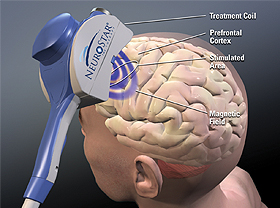Repeated Transcranial Magnetic Stimulation Now More Widely Available
 As reported in the BNN last year, a study by George and colleagues that was published in the Archives of General Psychiatry provided independent support and replication of earlier findings that active repeated transcranial magnetic stimulation (rTMS) is more effective than a sham procedure in the treatment of partially drug-resistant depressed patients.
As reported in the BNN last year, a study by George and colleagues that was published in the Archives of General Psychiatry provided independent support and replication of earlier findings that active repeated transcranial magnetic stimulation (rTMS) is more effective than a sham procedure in the treatment of partially drug-resistant depressed patients.
RTMS is a treatment in which a magnetic field is applied to a patient’s head, where it is able to affect tissue 2-3 centimeters into the brain. According to Neuronetics, the company that produces the rTMS machine, “The magnetic field passes through the hair, scalp, and skull and into the prefrontal cortex unimpeded. This method allows for precise, targeted stimulation, minimizing the stimulation of brain tissue not involved in mood.” The Federal Drug Administration approved the Neuronetics rTMS machine after a large, multi-center sham-controlled study was published by O’Reardon et al. in Biological Psychiatry in 2007. Since the FDA approval, availability of rTMS treatment and insurance reimbursement for the procedure have improved.
Covering the cost of treatment
A number of hospitals and private practitioners around the country are now able to offer treatment with rTMS. The Neuronetics website allows patients to search for sites where the treatment is offered. While a treatment sequence typically consisting of treatment five times a week for four to six weeks is relatively expensive (often in the range of $8,000-$12,000 or more for the series), some health insurance plans will now (perhaps after some argument and negotiation) cover some of the cost of treatment. It was estimated by Neuronetics personnel that about 75% of the time, with the assistance of Neuronetics and the physician staff delivering the rTMS, such insurance coverage can successfully be arranged. Neuronetics suggested that even if the claim is initially rejected, many treatment series will eventually be covered.
Neuronetics also provides assistance for patients with annual income under $42,000. These patients may be able to receive treatment free of charge. In addition, for those who have a higher income but are uninsured, Neuronetics offers a loan program for the gradual repayment of the cost of the procedure.
Stay tuned for more articles about rTMS this week!
Comments
Leave a Reply

